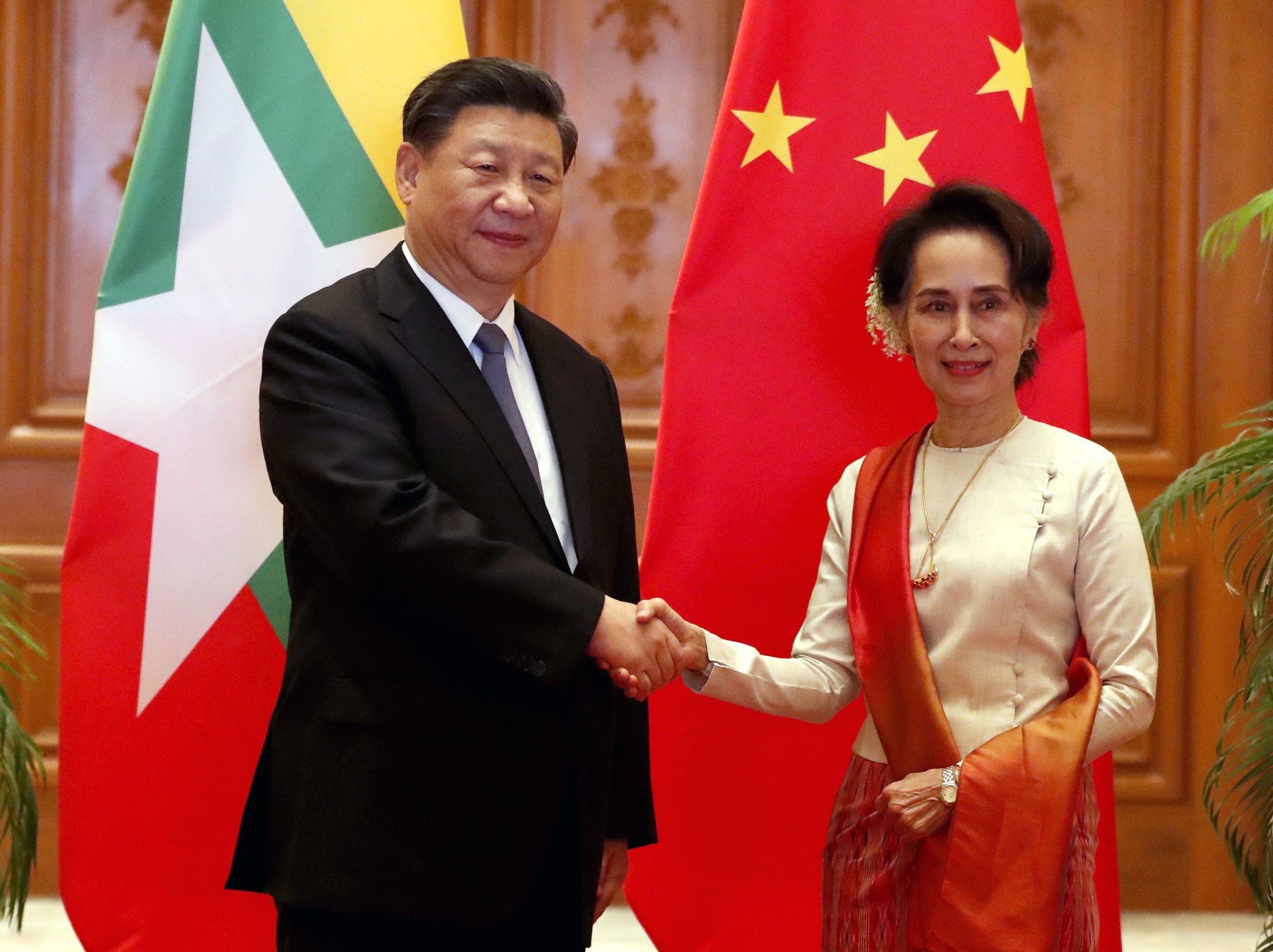
China and the Myanmese military government have signed a supplementary agreement for the Kyaukphyu deep water port, as both sides seek to get the stalled Belt and Road Initiative project off the ground.
The renewed push for the project in Myanmar’s restive western Rakhine state comes amid escalating violence between ethnic rebel groups and the ruling junta, which has prompted repeated security warnings from the Chinese mission.
Chinese state-owned Citic Group will, as agreed in 2018, maintain a 70 per cent stake in the port, which is expected to give China access to the Bay of Bengal as an alternative route for oil imports.
Do you have questions about the biggest topics and trends from around the world? Get the answers with SCMP Knowledge, our new platform of curated content with explainers, FAQs, analyses and infographics brought to you by our award-winning team.
Top Citic executives, Chinese diplomats and junta officials attended the signing of an addendum to the project concession agreement, in Myanmar’s capital Naypyidaw on Tuesday.
China sees Myanmar as stepping stone to Indian Ocean, energy security
The Kyaukphyu deep-sea port is a “major part” of Beijing’s belt and road strategy as well as the China-Myanmar Economic Corridor, and of “great significance to practical cooperation” between the two countries, Citic Group president Xi Guohua said during the ceremony.
“Citic Group will make every effort to promote the implementation of the Kyaukphyu project,” Xi pledged, according to a readout from the Chinese embassy in Myanmar.
Details of the addendum were not made public, but it is viewed as the latest sign that the key China-backed infrastructure project, which had made little progress since the military seized power in a coup in early 2021, is now back on track.
However, it comes as resource-rich Myanmar is in the throes of some of the worst ethnic violence since the coup, with intense clashes between military and an alliance of powerful ethnic armed groups, sometimes in coordination with anti-junta groups, erupting across the country.
Citing sources close to the ethnic rebel groups, Myanmese news portal The Irrawaddy reported on Wednesday that the junta and an alliance of three ethnic armies had failed to reach a peace deal at a second round of China-brokered peace talks last week in Kunming, capital of China’s southwestern Yunnan province bordering Myanmar.
The continued clashes prompted a fresh security warning on Thursday from the Chinese embassy, urging citizens to “evacuate as soon as possible” from Laukkai, a major town in the Kokang Self-Administered Zone near Myanmar’s northern border with China.
The fighting has also raised fears about the future of Chinese-backed infrastructure projects in Myanmar.
The US$1.3 billion port project, sitting on Maday Island off the fishing village of Kyaukphyu on the Bay of Bengal, is part of the Kyaukphyu Special Economic Zone, a scheme aiming to draw textile and oil refining industries that is at the heart of China’s relationship with Myanmar.
It is also a key section of the 1,700km China-Myanmar Economic Corridor, a planned network of railway, roads and oil and natural gas pipelines running from Kunming in China’s Yunnan province to the Indian Ocean.
During a state visit to Myanmar in early 2020, Chinese President Xi Jinping hailed the economic corridor as “priority among priorities” for the belt and road, a global infrastructure drive that has become a cornerstone of Beijing’s foreign policy.

Kyaukphyu port is expected to give Beijing strategic access to the Indian Ocean while offering China an alternative energy route to the Strait of Malacca, a narrow waterway between the Indian Ocean and the South China Sea that now transports some 80 per cent of China’s oil imports from the Middle East.
Beijing-based Citic, one of China’s biggest and the oldest financial conglomerates, was chosen to take the lead in the Kyaukphyu Special Economic Zone and deep seaport projects in 2015.
However, little progress was made until Citic and the then Myanmese government, led by Aung San Suu Kyi’s National League for Democracy, reached a framework agreement in 2018 to scale back the port investment from US$7.3 billion to US$1.3 billion.
A joint management committee was also set up between Citic and the Myanmar government on a 70:30 holding basis, with a 50-year lease for the Chinese company.
But regulatory issues have stalled progress on the project. This has frustrated Beijing, with Chinese officials publicly urging the Myanmar government to push forward infrastructure plans under the China-Myanmar Economic Corridor.
Rebel fire and China’s ire: inside Myanmar’s anti-junta offensive
As the domestic conflict in Myanmar continues, there are growing signs that the military government – increasingly isolated by international sanctions since its 2021 coup – is looking to bring China-backed projects back on track.
In February, Citic said it had completed a 10-month field survey for the port project. A report was released in September, paving the way for construction, with the SEZ committee starting to invite bids last month.
Earlier this month, Aung Naing Oo, the Myanmese commerce minister, announced the conclusion of negotiations with Citic Group over the deep seaport business licence agreement signed by the previous government.
More from South China Morning Post:
- China brokers talks in Myanmar between military junta and rebel groups that yield ‘positive results’
- Myanmar on the brink but Asean could be ‘caught off guard’ if the junta were to collapse
- China issues most wanted list in latest bid to clamp down on Myanmar’s sprawling cybercrime industry
- Myanmar’s junta wants China’s support. Analysts expect ‘cautious pragmatism’ from Beijing
For the latest news from the South China Morning Post download our mobile app. Copyright 2023.










































